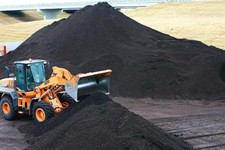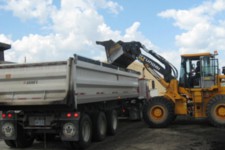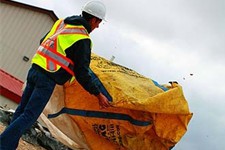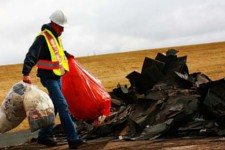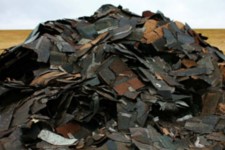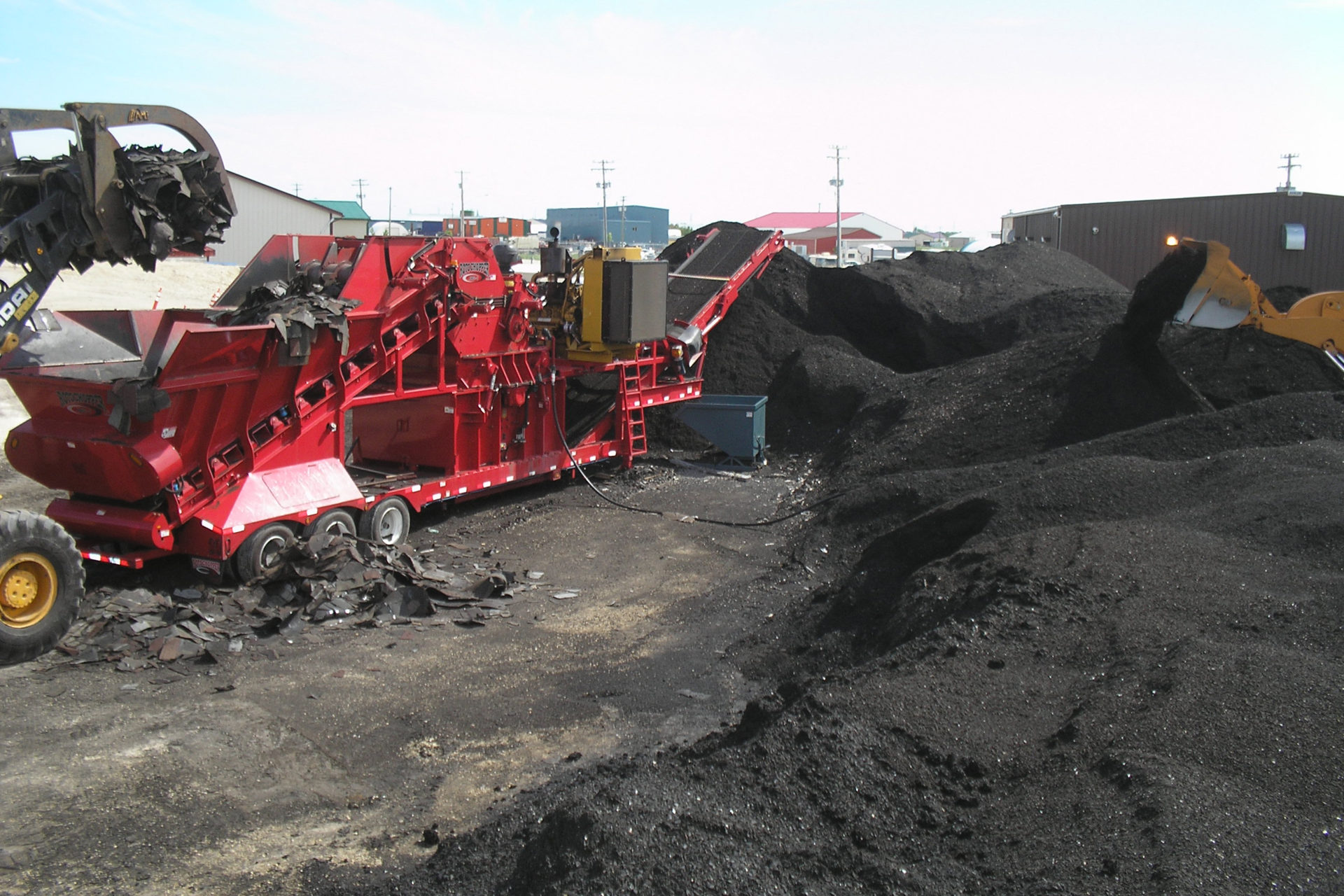
Greensite Recycling Turns to Rotochopper for a Tear-off Grinding Solution
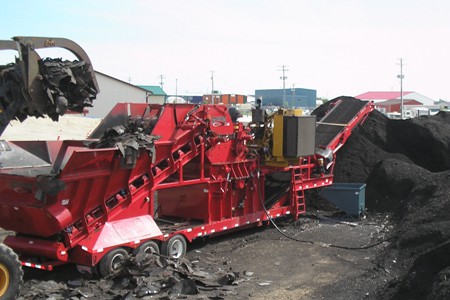
A roofing company creates an alternative to landfills
What seemed like a natural choice for Krueger was relatively novel, given his location and profession. As a roofing and remodeling contractor with over 25 years of experience, Krueger recognized the profit potential of the tear-off shingles that he was routinely hauling to a Winnipeg landfill. Yet shingle recycling had traditionally been limited mostly to asphalt paving companies and contract grinders. Moreover, shingle recycling was virtually non-existent in his province of Manitoba, Canada.
Krueger explains that “Shingle recycling has been generating buzz for some time, but in this region, it’s been lots of talk, no action. As a roofing contractor, every year we would produce tons of tear-off shingles that, unfortunately, would just go into a landfill and cost a lot of money in tipping fees.” Recycling seemed to be an obvious solution, he says, but his company did not generate enough shingle waste to support a full-scale operation. Because no companies in the area were recycling shingles, roofers were left without any alternatives to landfilling.
Pictured at right: Tear-off shingles that have been processed to 3/8″ / 9 mm minus for use as a hot mix asphalt paving supplement.
Starting a RAS operation from the ground up
In June of 2008, when Krueger contacted his Rotochopper sales rep asking about asphalt shingle recycling and the RG-1 shingle grinder, all he had was an idea, a few tons of shingle waste, and confidence. He didn’t even have an established market for the processed shingle waste (RAS), but he knew he could build one.
Ten months later, John Krueger Enterprises, a contracting company specializing in roofing projects, was running a full-scale shingle recycling operation, with an RG-1 shingle grinder at its center. Within this short time, he has succeeded in securing the equipment, a steady raw material supply, and a market—largely by his own initiative.
Pictured at right: Recycled asphalt shingles (RAS) being loaded for delivery to a local hot mix asphalt plant.
Specifically, without a provincial specification for the use of recycled asphalt shingles (RAS) in asphalt paving mixes, few people were expressing any serious interest in shingle recycling. Without serious interest in shingle recycling, there was nothing to instigate the development of RAS specifications. Krueger began simultaneously building the supply, the demand, and the means for fulfilling the demand in the form of RAS specifications.
Securing a steady supply of clean shingles
In late 2008, with an RG-1 shingle grinder on order, Krueger developed a site in Winnipeg for his shingle recycling operation. He opened the yard to contractors to deposit tear-off shingle waste. Krueger’s facility was more attractive to contractors than the landfills, as it stayed open later and was located closer to town. Greensite Recycling was soon taking in an increasing supply of tear-off shingles.
As a roofing contractor, Kruger knew that a key to his long-term success was developing relationships with fellow roofers to ensure a steady supply of clean shingles. More convenient hours and location were just the initial incentive to entice roofing contractors. The way to build relationships with roofers, he knew, was through education. “Once the roofers understood how they could save money, as well as make the homeowners happier by recycling through Greensite instead of landfilling, our shingle supply started to grow,” Krueger notes.
Pictured at right: Greensite Recycling provides “Rhino bags” to roofers for segregating miscellaneous trash from shingles.
Once he got the interest of roofers, he says, educating them about the value of source separating their shingles was easy. Because roofing contractors can cut their disposal costs by up to 50% by choosing to recycle, they quickly complied with Greensite’s guidelines for clean loads.
Focusing on the roof, not just the road
Krueger firmly believes that, for tear-off shingle recycling, quality control “begins on the roof,” with the roofers source separating the shingles removed during re-roofing projects. Jeremy Kosman, Greensite general manager, adds that “Our approach to tear-off shingle recycling is driven by our years of experience in the roofing business. We knew that source separating shingles at the jobsite would be just a matter of changing from the habit of putting everything into one trailer or dumpster.” To help roofers keep shingles separated, Greensite began offering contractors plastic bags, or Rhino bags, to contain unacceptable materials like the shingle bundle plastic wrappers. If all of the foreign materials are contained within a Rhino bag, they can be quickly removed when a load is tipped at Greensite’s facility.
Pictured at right: Jeremy Kosman, Greensite general manager, carries “Rhino bags” filled with shingle bundle plastic wrap and other roofing waste materials away from recently tipped tear-off shingles.
By accepting only clean loads of shingles, Greensite is able to keep processing costs low and pass savings on to the roofers. When loads of shingles arrive, they are inspected to ensure that they are free of foreign materials like wood, plastic wrap, and discarded roofing tools. Loads with unacceptable materials are rejected. Clean loads are tipped, quickly inspected, at which point any remaining contaminants are removed, and then quickly pushed into a pile of clean shingles that are ready for grinding.
Securing a market
After securing the proper equipment, processing site, and raw material, Krueger formalized an agreement with a local paving company, Maple Leaf Construction, Ltd, to supply properly ground shingle waste for use as a hot mix asphalt supplement. Greensite then retained the independent lab services of Thunder Bay Testing (TBT) Engineering to test the RAS and develop specifications for its use in asphalt paving mixes.
Positive numbers & reviews
The first season of testing showed high asphalt cement content (about 34%), resulting from the predominance of organic (paper-backed) shingles in the Manitoba area. By comparison, the fiberglass mat shingles used in warmer climates typically have lower AC contents (about 20 – 25%). Since tear-offs typically lose some of their aggregate from weathering, the AC content of RAS made from tear-offs is often higher than RAS from factory rejects.
After Greensite obtained these figures, Maple Leaf Construction, Ltd completed several paving projects using RAS from Greensite. Top course mixes consisted of 3% RAS by weight. Bottom course mixes incorporated 4% RAS. Testing of the finished hotmix product indicated that 18% of the total asphalt binder was from RAS, with the remainder from virgin asphalt binder (reclaimed asphalt pavement or RAP was not used in initial project study pavement mixes). Tests showed that the finished asphalt pavement was almost completely free of the organic material (paper) in the tear-offs, which is burned away in the drum at the hot mix plant as the RAS, virgin binder, and aggregate are heated and mixed to form hot mix asphalt.
Pictured at right: A roofing contractor arrives with a load of tear-offs and drives onto a scale to determine tipping fees.
Most of the RAS Greensite produced in 2009 was used for testing and small private paving projects. In 2010, a spec was approved to allow the use of RAS on residential streets and multi-use paths in Winnipeg.
Strategic planning
Throughout the planning and implementation of his shingle recycling operation, John Krueger received strategic and technical consultation from Dan Krivit of Foth Infrastructure and Environment, LLC. A shingle recycling consultant who works with public and private organizations to develop shingle recycling systems and specifications, Krivit points to Greensite Recycling as a model for the future growth of shingle recycling. “What John Krueger has accomplished here is truly commendable,” says Krivit. “He has, for the most part, created this whole market on his own—no government incentives, no recycling mandates, no existing groundwork to build on within this region.”
Green marketing speeds the growth of Greensite Recycling
Roofers are more likely to get re-roofing contracts if the homeowner knows the waste will be recycled with no effect on quality or price (which may be slightly lower if the roofing contractor passes on the savings they get by recycling instead of landfilling). Some roofing contractors are drawn to the environmental benefits Greensite offers, only to be pleasantly surprised by the cost savings over landfills. Likewise, the use of RAS helps asphalt paving companies maintain a positive public image, which is extremely important, since asphalt pavement tends to have an undue reputation for being an environmentally harmful product, Krivit notes. The green marketing benefits help Greensite Recycling maintain a steady supply of shingles and demand for RAS, which “sells as fast as we can make it,” Krueger says.
A shingle grinding solution for a complex business
Despite the success of Greensite Recycling, Krueger has no plans of getting out of the roofing business. “Obviously, I’m excited about shingle recycling, and I have been deeply involved in developing my shingle recycling operation, but we are still very much focused on our original business—home remodeling and reroofing.” Krueger observes that operating John Kruger Enterprises alongside Greensite Recycling provides a unique perspective into tear-off shingle recycling. Kosnan agrees: “As roofers, we understand the challenges involved with tear-offs and how simple they are to overcome with proper planning and education. By maintaining our roofing business, we also remain closely connected to other roofing contractors generating tear-offs.”
Krueger adds, “We didn’t want the shingle recycling operation consuming our time and attention, regardless of how profitable it becomes. That’s one reason we decided on Rotochopper shingle grinding equipment: with less wear and maintenance time, we can focus on our business, not our grinder. We looked at different grinders processing shingles. Rotochopper showed us that their equipment could give us a finished RAS material with much less wear and less time on maintenance.” Krueger notes that their Rotochopper shingle grinder has experienced very little wear-related maintenance, other than tooth and screen wear. “After what I had heard about the wear costs of grinding shingles, I am surprised by how little wear this grinder has shown,” he says.
Pictured at right: Clean tear-off shingles ready for grinding.
To Krueger, the time saving benefits of his RG-1 do not simply add up to more time to focus on his company’s shingle recycling and re-roofing business. Spending less time on equipment maintenance means more time to focus on building relationships with customers. “We are offering a better way to handle the waste from re-roofing projects and a better way to make roads,” Krueger says. “People respond really well once they understand what we’re doing. The challenges come down to a matter of fostering understanding and trust. With a continued emphasis on educating people about shingle recycling, we’re confident that we will continue to grow.”

